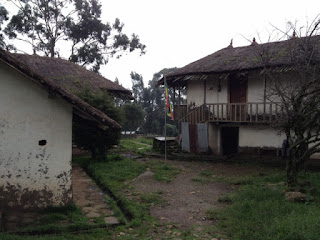Q
Queen Elizabeth
As a former British colony Uganda still has Queen Elizabeth as a figurehead and is proud of her various visits to the country. The most recent was to the Commonwealth Heads of Government conference when the Munyonyo Commonwealth Resort Hotel was built.
One of the best known and most visited parks in Uganda is the Queen Elizabeth National Park in the South West. The park is fairly easy to get to from Kampala in a day and is in the right place to combine with a trip to see the gorillas in the far south west. We trekked chimpanzees in QENP in the beautiful Kyambura gorge. This is real rain forest and made a very interesting trip.
R
Religion
Religion is very important in Uganda. Over 80% of the population is Christian with roughly half of those Catholic. There is an Anglican church in the Church of Uganda but many people attend the various pentecostal or miracle churches. Church buildings are huge and are beautiful inside with excellent sound systems and packed congregations. We went to the baptism of a friend's baby at a Catholic Church. The service started at 11.30 and was the 4th service that morning. 10 babies were christened combined with a large number of children taking their first communion. Overall the service lasted for 3 hours.
Namirembe Cathedral in Kampala (Anglican)
S
Sustainable Livelihoods
The partner organisations I've been working with are part of the Sustainable Livelihoods programme. This divides roughly equally between those working on land rights and those working with farmers groups on sustainable agriculture. A real bonus of my time here has been the opportunity to learn more about the sustainable livelihoods programme work. Even seeing so many of the things we are used using processed as the original unprocessed crops has been really interesting.
Cotton
Pineapple
Teak trees
Swahili
Swahili is not a common language in Uganda unlike other countries in East Africa such as Kenya or Tanzania where it is one of the main languages uniting different regional groups. However, as Uganda becomes more integrated in the East African Union, Swahili is now an official language and is being taught in schools.
T
Tribes
In Uganda the tribe you belong to is an important part of your identity. While I have been living here the government has been rolling out a national identity card programme and a key question is which tribe you belong to. Tribes have their own cultural identity and customs.
U
Uganda
Uganda is a fascinating, beautiful country with an interesting history. The name 'Uganda' comes from a mispronunciation of name of the tribe living in the central area by the British. The tribe is the Buganda but when the country was named the 'B' was lost.
Uganda is a landlocked country bordered by South Sudan, Kenya, Tanzania, Rwanda and the Democratic Republic of Congo. There is a natural border formed by the Nile through the middle of Uganda. The official borders were drawn up when Africa was split by the colonial powers and don't fit with natural borders. Hence the borders in many areas are porous as people move between their different family members in different countries. Even the local languages are the same across many border areas.































